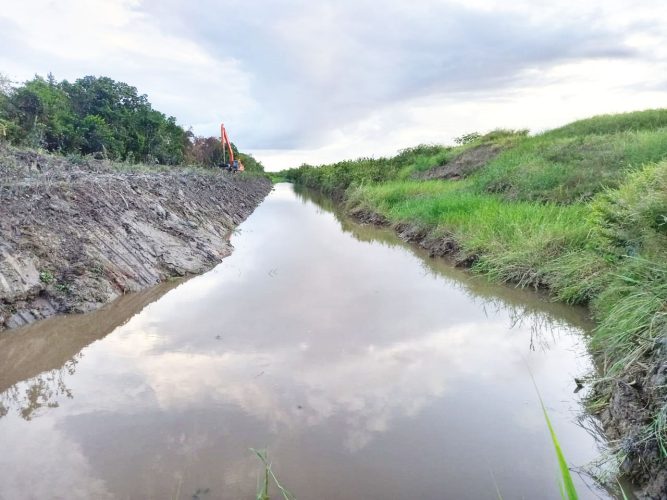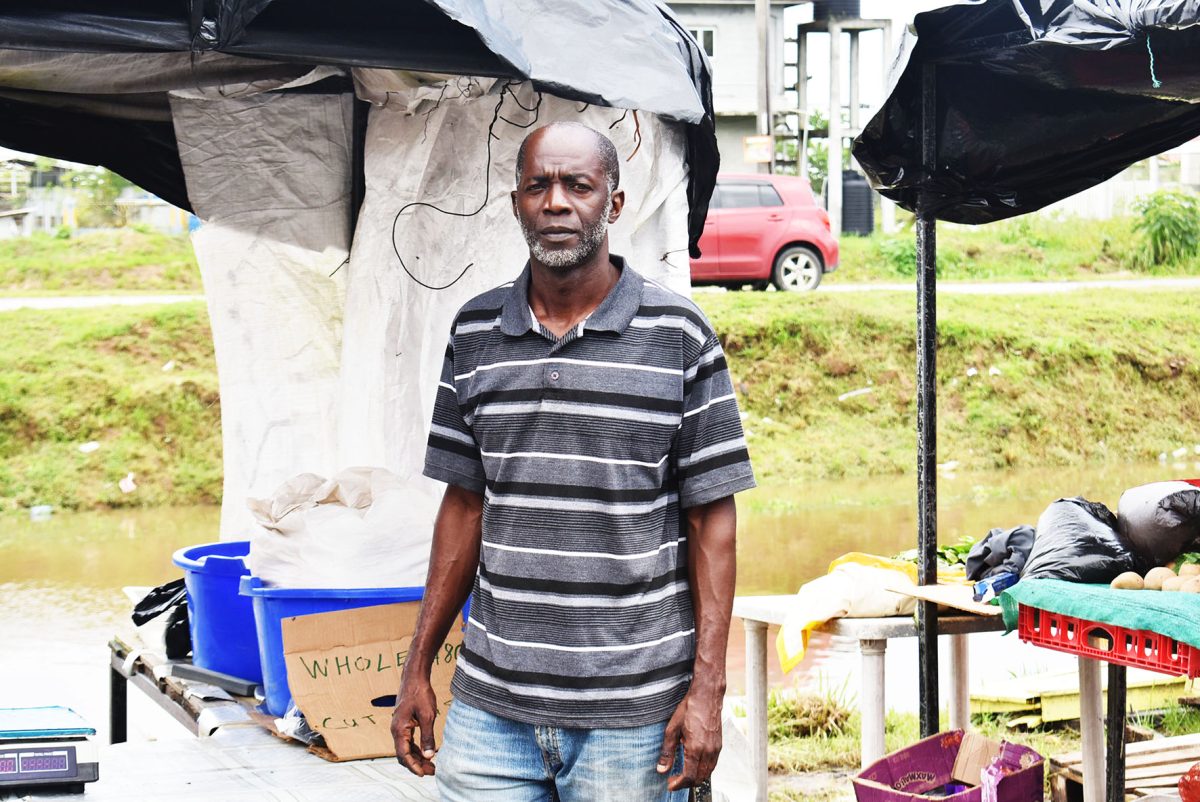Various drainage, irrigation and other development-oriented projects executed in the Mocha/Arcadia community in recent years have seriously eroded the efforts of residents of the community to sustain long-standing modest but impressive farming initiatives that have played an integral part of their lives and livelihoods over the years. What comes most readily to mind are the highly successful cultivation and marketing initiatives that the community have undertaken and the outcomes of these for the livelihoods of residents of the community as well as a marketplace where buyers would congregate on designated days to purchase greens, vegetables and poultry.
Mocha and its adventure with farming and entrepreneurship had been the subject of consistent coverage in the Stabroek Business, our reportage extending to the work of the local cooperative society, the driving force behind the farming venture and the creation of the periodic Sunday Market Days. The success of the venture reposed in the fact that farming provided, in many instances, ‘second jobs’ for residents of a working class community. Beyond that, over time, the Mocha Market had become popular enough to attract shoppers from communities along the East and West Bank Demerara and from Georgetown itself. The Mocha Market had never enjoyed the privilege of sustained success, its routine periodically interrupted by sustained downpours and floods resulting from a less than reliable drainage system and threats posed to their livestock by wild animals that occupy the backlands.

For a period, at least, none of these prevented the community from periodically ‘turning out’ weekend Market Days, the offerings in terms of meats and vegetables competing favourably, in terms of prices, with many of the various other markets elsewhere in coastal Guyana. The growth and survival of the Mocha Market has long been attributed to the resilience of the resident farmers and the organizational ‘glue’ afforded by the Mocha Arcadia Multipurpose Agricultural Co-operative Society (MAMPA). It would, of course, be naïve to ignore the political fallout from the demolition of houses and the physical confrontations and legal encounters between the state and residents of the Cane View/Mocha Community that erupted just over a year ago and which discommoded long-standing squatters and also had a knock on effect on the community as a whole. In effect the community as a whole seemed to ‘stop’ to ‘address’ this development, a move that distracted from its traditional farming pursuits.

Mocha/Arcadia’s agricultural ambitions, incidentally, had already earlier become seriously compromised by the severe seasonal rains of 2020-2021 and the attendant heavy flooding of the farmlands. What made an already unwholesome situation decidedly worse was the impact on drainage and irrigation considerations in the wider community arising out of the major developmental/housing projects along the East Bank corridor that had eventually arrived at the community’s proverbial ‘front door.’ The farmers, by now, had begun to return to the land but only following numerous protests by residents demanding that the wider challenges confronting the community occupy the attention of central government. Government’s response, it was felt, was inadequate, its offerings that included offers of planting material, fertilizer, and equipment with which to address the drainage and irrigation issues deemed to be insufficient to address a situation which, by then, had seemingly become ‘political.’
Just over a week ago, the Stabroek Business spoke with Raeburn Jones, the long-serving Chairman of the Mocha/Arcadia Multi-Purpose Agricultural Cooperative Society and the Society’s Secretary, Beverly Mc Lean. Their report was more than a little encouraging. Arising out of the Stabroek Business’ engagement with the two we learnt that around 60% of the community’s farmers had returned to the land. It was, Jones and Mc Lean told us, an act of necessity. The farmers that have gone back to the land are overwhelmingly dependent on farming for their livelihoods. Others are engaged in a jittery game of peek-a-boo with the weather, mindful of the earlier period of flooding that had brought their farming pursuits to a costly halt. Beyond that, many of them are unable to meet the investment costs associated with an immediate and seamless return to farming.
As Jones explained, those farmers who are back ‘on the job’ were required to absorb the costs associated with “starting over,” erecting raised beds that provide a greater level of defence against rising water levels. Starting afresh, Jones says, includes extensive and costly land-clearing, a level of investment that is beyond the relatively modest means of most of the farmers. The exercise involves the clearing the land of all the crops including the permanent trees. Those farmers who ignored the procedures associated with the raising of beds, Jones told the Stabroek Business, paid a heavy price in ruined crops, ‘wiped out’ by the seasonal rains earlier this year. Those who ‘bought into’ the prescribed modifications fared better.
Jones explained that the “process is also slow “, because the time span between preparation of land (meaning clearing land and adding nutrients such as limestone to the land) to planting may take six months, while in some farming areas was immediate. According to Jones, farmers who experienced the increasingly apparent linkage between the behaviour of the weather and its impact on farming now have what can be described as a ‘rough but real’ understanding of the phenomenon of climate change.
He recognizes, he says, that contemporary climate behaviour has compelled farmers “to move away” from the traditional methods of farming and adopt approaches that “work around” weather patterns. The Mocha/Arcadia farmers, Jones says, while not being climate scientists are increasingly recognizing that changing weather patterns have become a critical element in approaches to agriculture.
But that is not all. Jones believes that other facets of development that are linked to change also threw up challenges that impact on the well-being of the agriculture. Here he posits that the disappearance from what were once sugar production related canals, previously used for the transportation of cane from field to factory, but which also served as drainage and irrigation channels, have impacted negatively on communities as sugar estates have made way for other kinds of development projects including residential communities. These developments, according to Jones, have given rise to the necessity for the implementation of raised beds and Shade Houses which have become important, if not critical, to the well-being of agricultural communities. Needless to say, Jones asserts, these developments come at considerable cost.
Concerned as he appears to be about the future of farming (and by extension the well-being of many of the residents of the Mocha Community), Jones told the Stabroek Business that he remains optimistic. Here he points, first, to the evidence of enduring optimism on the part of the residents of the community, not least the farmers, who remain anchored to the land. This is not to say that pockets of concern do not exist. The Chairman of the Mocha/Arcadia Multi-Purpose Agricultural Cooperative Society believes that “more structure and streamlining” should be applied in the process of what now appears to be a makeover exercise in the community. He is, he says, an advocate of consultation at the community level that “links them” to major developments in the community.
Beyond that, Jones is critical of what, sometimes, appears to be an absence of oversight in the execution of state projects that require varying measures of expert supervision. Jones believes that, often, there is a lack of evidence of the presence of engineers to monitor the execution of seemingly complex and challenging assignments. It is, he sees, the future of farming in the Mocha community (given its importance to the economy of the community) that troubles Jones above everything else. During a recent meeting with state officials in the community an undertaking was given that official support would be provided to execute one of the more pressing assignments for farmers in the community – the raising of beds. The official undertaking, Jones told the Stabroek Business, has been attended by related undertakings including enhanced drainage and irrigation infrastructure and fertilizer supplies. Jones believes that honouring those commitments depends, overwhelmingly, on the interlocking efficiency that obtains in the collaborative effort of the various state agencies involved in the execution of the government-funded projects.
On the whole Jones is of the view that insufficient official attention is paid to assigning expert oversight to specialized projects – that requires a high level of skills – and which are important to the well-being of the communities in which they are being executed. According to Jones, for several years the Mocha/Arcadia Multi-Purpose Agricultural Cooperative Society has been sending signals regarding its plans to ‘graft’ manufacturing (agro processing) onto its list of entrepreneurial pursuits. If the realization of this ambition is still some distance away Jones believes that such an initiative is not only do-able (given what he knows to be the skills’ pool located in the community) but that it could add another ‘string’ to the bow of the community’s economy at the level of the household.
The Society’s Secretary, Beverly Mc Lean ‘comes alive’ when the issue of Agro Processing arises. She told the Stabroek Business that she is aware of the presence of more than thirty five (35) Agro Processors residing in the community. That resource apart, she also said that the ambition of setting up an Agro Processing Plant in the community has been ‘on the cards’ for some time now. Premises have already been earmarked for the housing of the facility. McLean told the Stabroek Business that the Cooperative Society is seeking an audience with the Ministry of Agriculture on this issue.
Some measure of progress has been made. Agro Processors in the community are at various stages of securing their product verification credentials from the Government Analyst Food and Drugs Department. According to McLean, the idea of a community-based Agro Processing facility is still ‘very much on the cards.’ Reportedly, the Cooperative has secured the services of Food Technologists who are providing training for Agro Processors in the community. The Society has set itself a timeline of the end of 2024 for the acquisition for a modern agro processing facility.
The community’s ‘Lode Star,’ its Market Day, has, over time, attracted supporters along the East Bank and West Bank communities. Mc Lean concedes her disappointment that the Market Day has not been staged over several months. She is, however, ‘hyped up’ for the Sunday December 22 event. She has embarked on a personal mission to aggressively promote the event. The likely offerings for the forthcoming Market Day will include Banana, Plantain, Sweet Potato and assorted Vegetables being cultivated ahead of the much anticipated event, Mc Lean told the Stabroek Business. Ahead of the December event some Mocha Agro Processors have already been made appearances at the September Buxton Expo and at the recent UNCAPPED event at the National Stadium.
Last week the Mocha Farmers were scheduled to participate in a Seminar and Exhibition hosted by the Institute of Research, Innovation and Entrepreneurship (IRIE) at the University of Guyana. The group has also ‘signed up’ for the December 25th – 30th Christmas Market on Main Street Avenue. The available evidence would appear to suggest that the challenges facing the Mocha/Arcadia are being treated as humps in the roadway rather than immovable impediments to the community getting it where it seeks to go.






